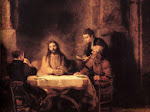
A friend and I recently discussed universalism in Christian history. He suggested I read The Great Divorce by C.S. Lewis, which addressed the topic. I just finished it. Lewis meant to contrast this work to that of William Blake, The Marriage of Heaven and Hell, in which Blake told of a union of the two.
In this fantasy, the no-name narrator awakes in a bleak, lonely city. He eventually discovers it's hell. Though anyone can wish anything into existence, they keep wishing new houses further and
 further apart from each other because they can't stand each other.
further apart from each other because they can't stand each other.He finds a bus stop, and gets in line. He discovers the bus takes you to the beautiful foothills of heaven (on sort of a holiday). There the passengers can move on to the high country of heaven (in which case hell becomes purgatory for them).
After they roam around some, shining ones come to meet them and urge them on to the high country. Each shining one is someone they knew in their past life who has chosen to come down from the high country to urge the passengers to repent and move up. The narrator gets to observe these interactions.
Usually, the passengers have clung to something they refuse to let go of which would enable them to move up. The interactions provide the most fascinating aspect of the book. Through the narrator, you hear just about all the excuses and justifications for sin and self-absorption that basically exists. Sadly, most of the passengers can't wait to get back to the bus and return to the bleak city (hell).
 The shining one guide for the narrator, who explains what is going on, turns out to be George MacDonald (a 19th Cent. fiction author, poet, and Christian minister) whom Lewis considered his imagination mentor. MacDonald promoted the possibility of universalism (God's love will save everyone). The book in part seems to be a way for Lewis to reconcile himself with some of MacDonald's views.
The shining one guide for the narrator, who explains what is going on, turns out to be George MacDonald (a 19th Cent. fiction author, poet, and Christian minister) whom Lewis considered his imagination mentor. MacDonald promoted the possibility of universalism (God's love will save everyone). The book in part seems to be a way for Lewis to reconcile himself with some of MacDonald's views.Many of the issues of heaven and hell, salvation, predestination and election take a different perspective as the guide attempts to put them in the perspective of eternity instead of our linear way of looking at time. In any event, the guide conveys the notion that those in the bleak town have chosen to live there, and will not likely want to give it up.
In the end, the narrator wakes up and realizes it was all a dream which reinforces what Lewis said in his preface that all this was a fantasy - a means of exploring these issues (not a theological essay - which some seem to confuse it with - Lewis always renounced any claims to being a theologian.)










